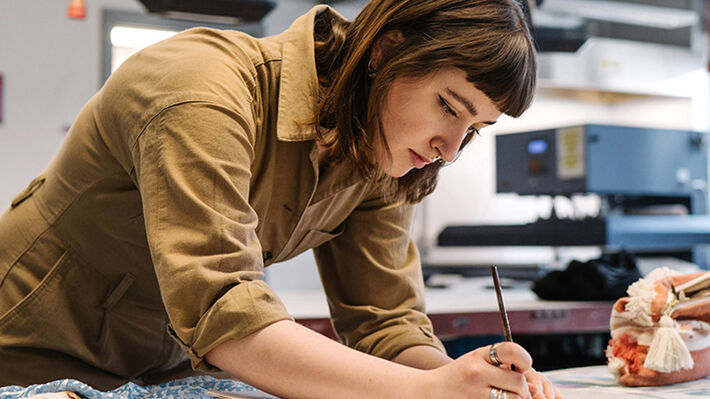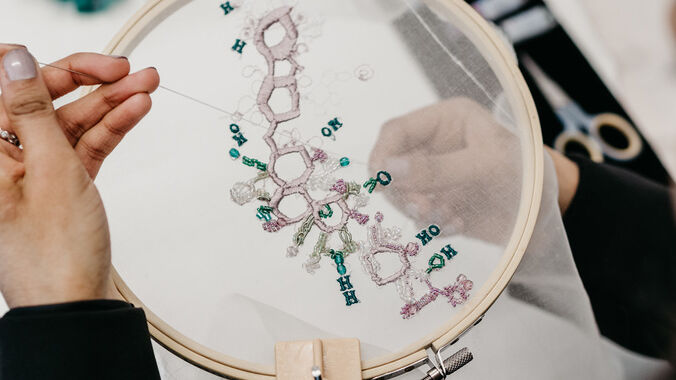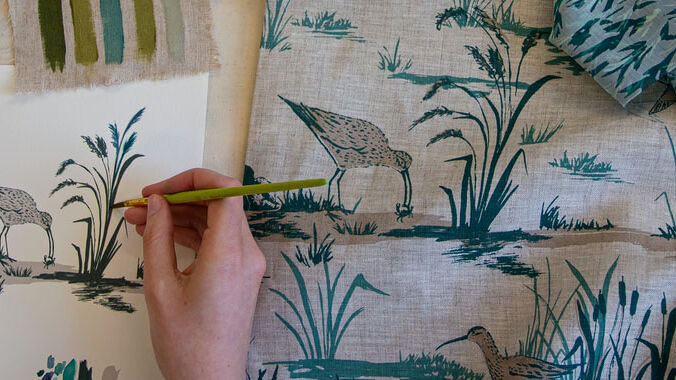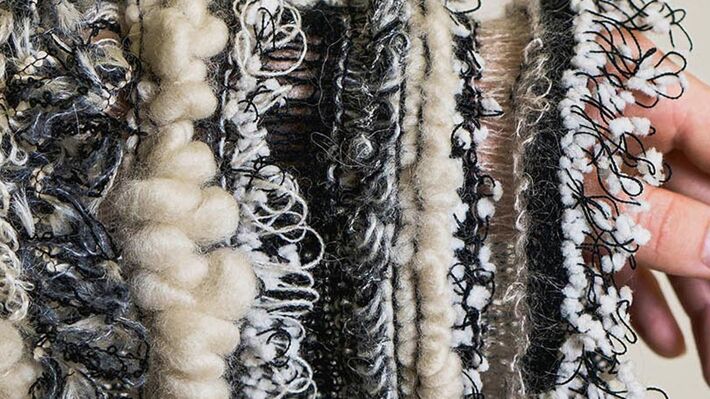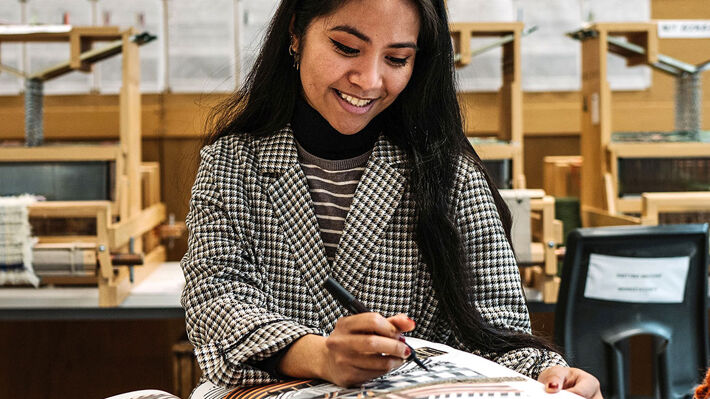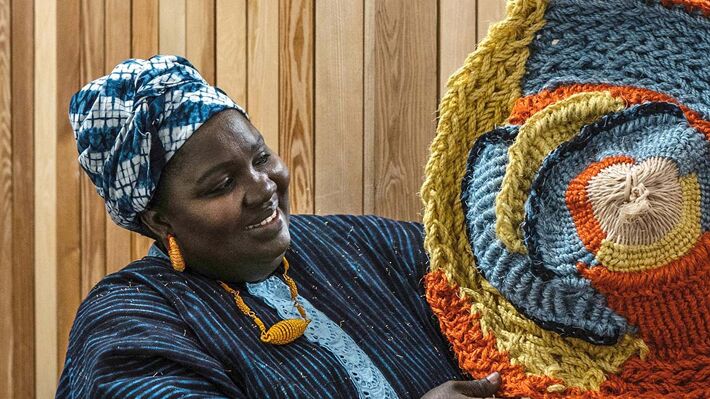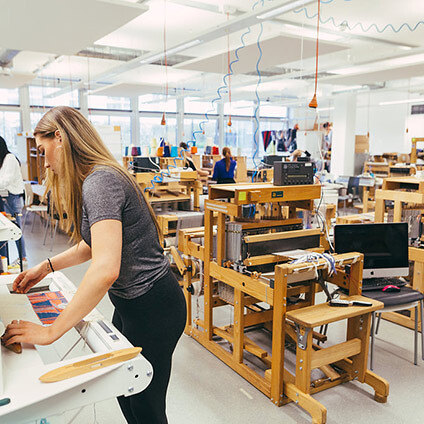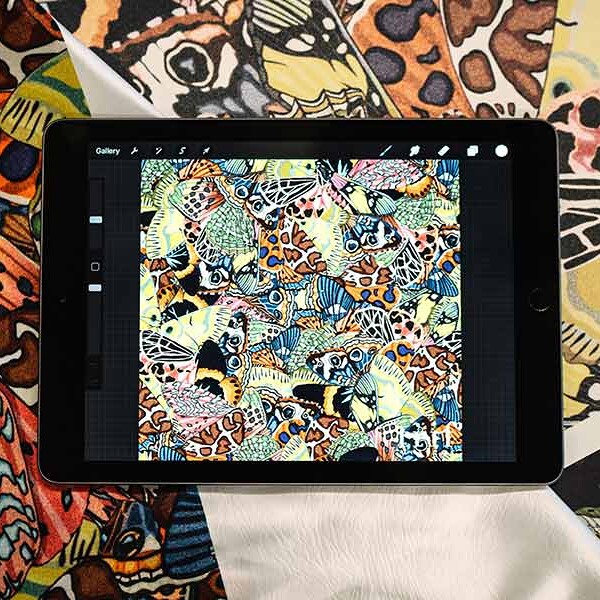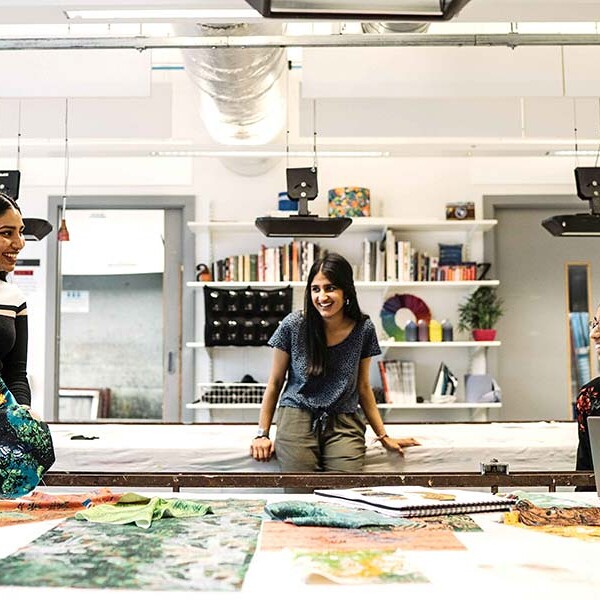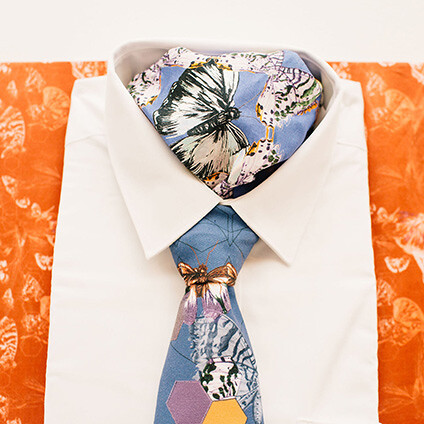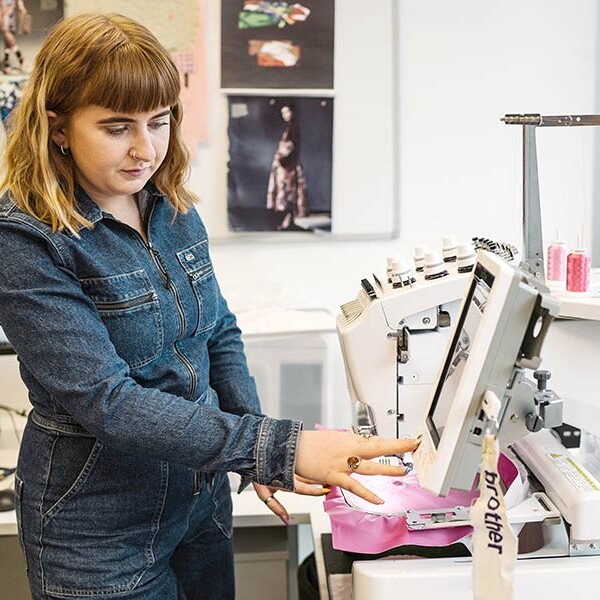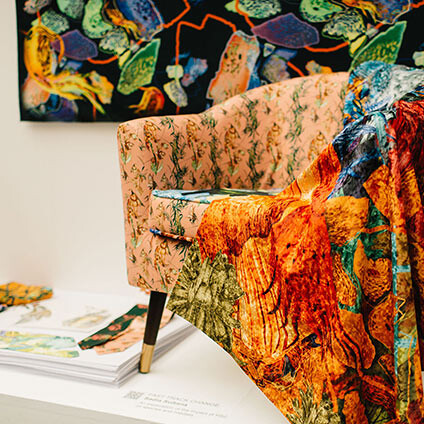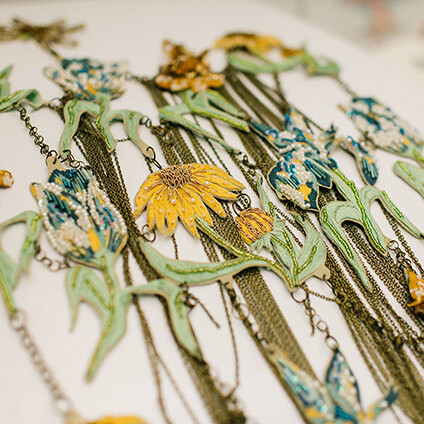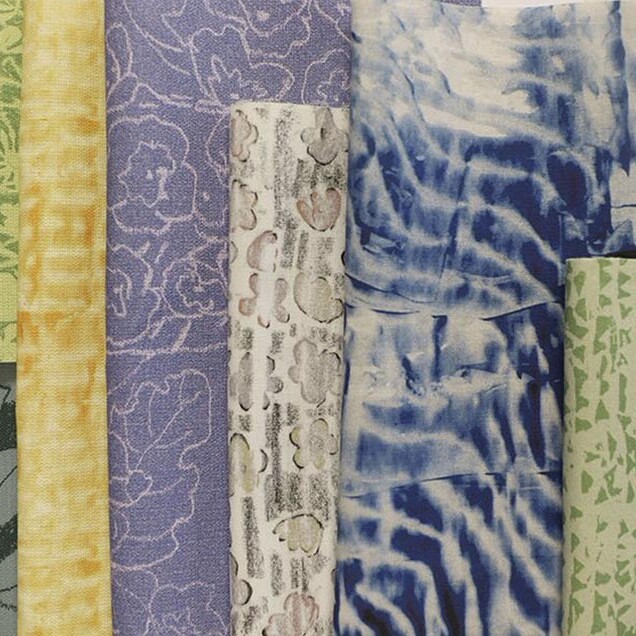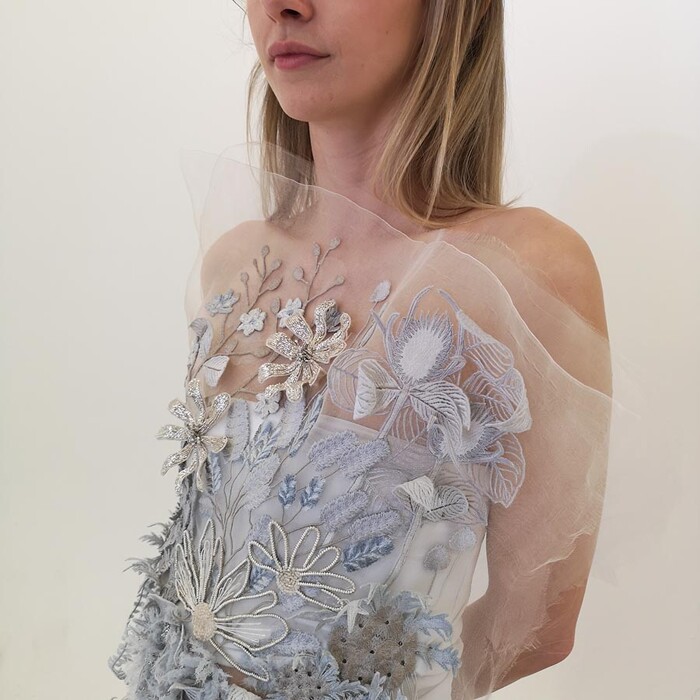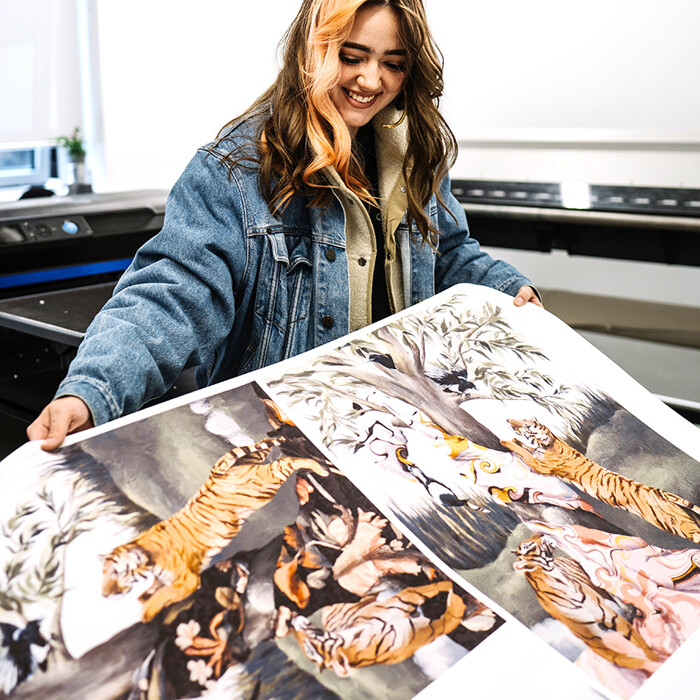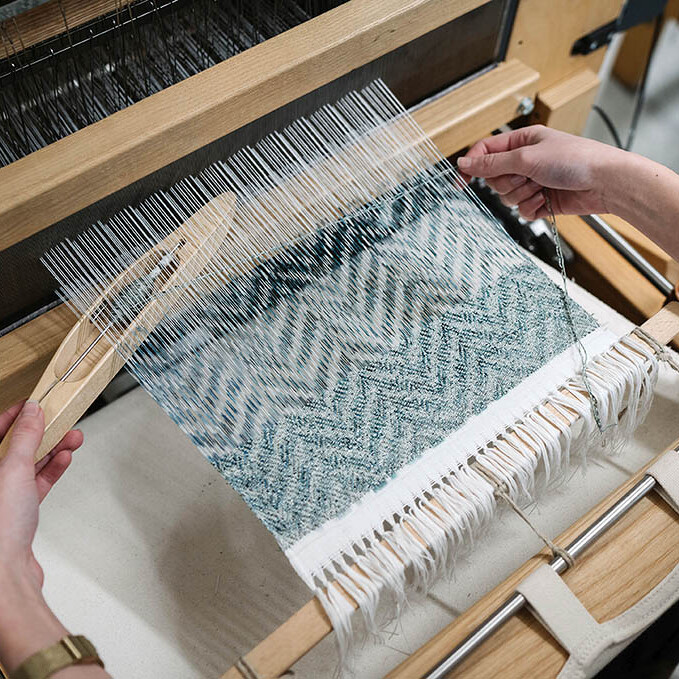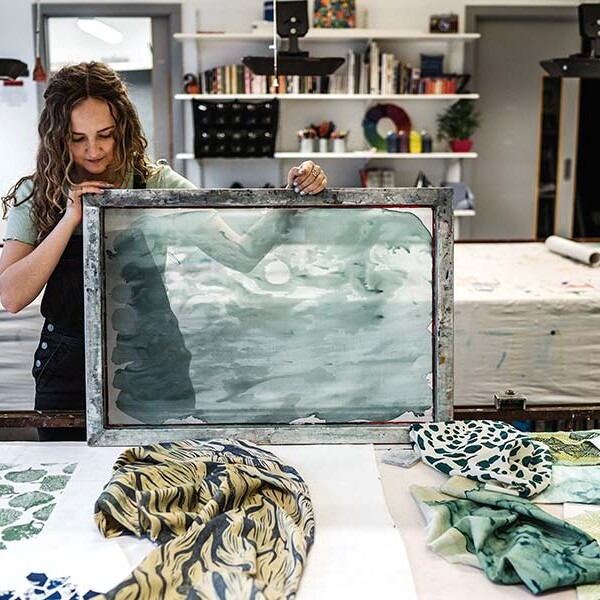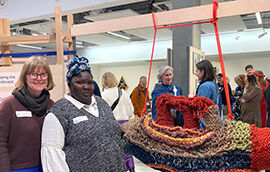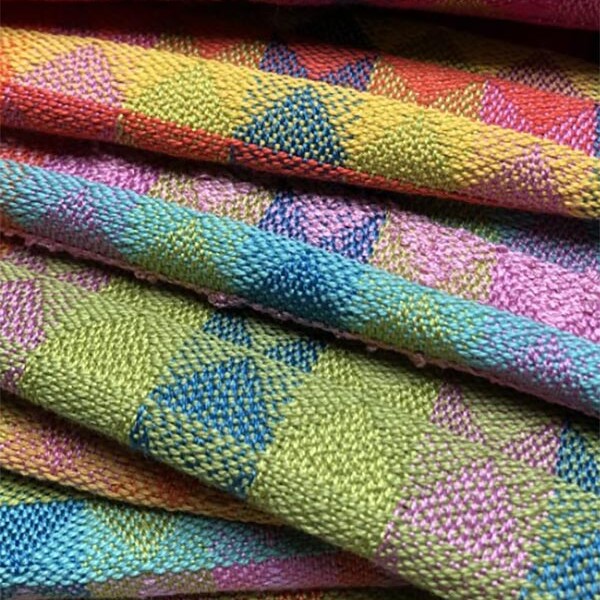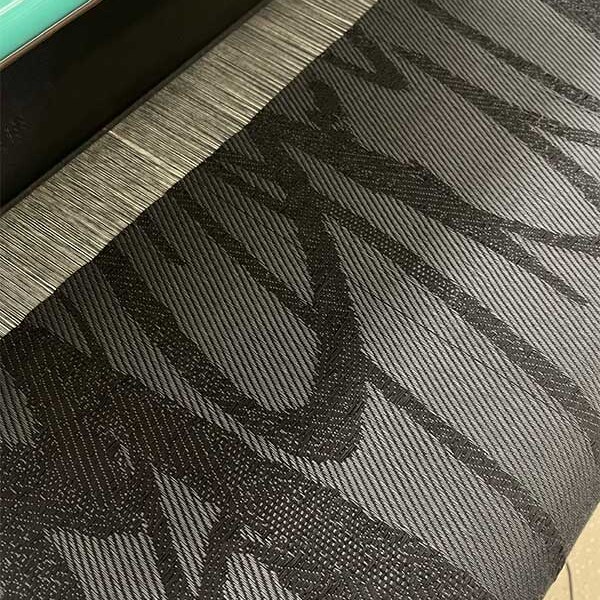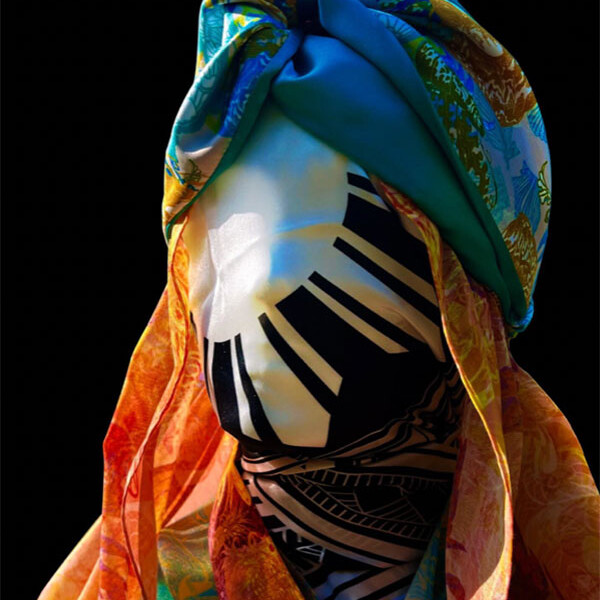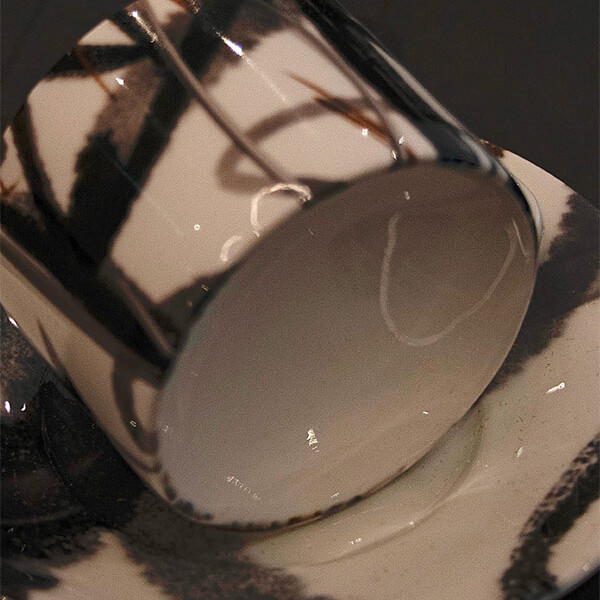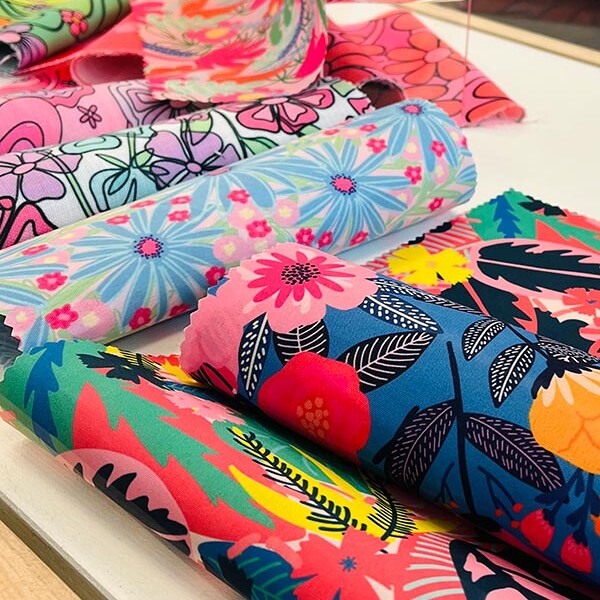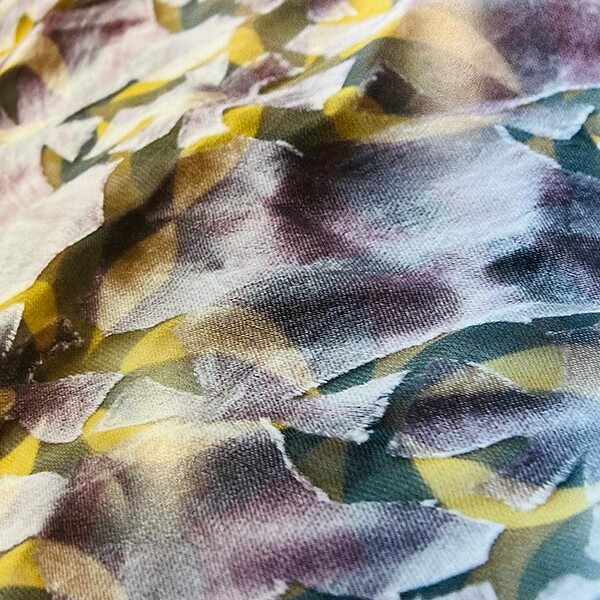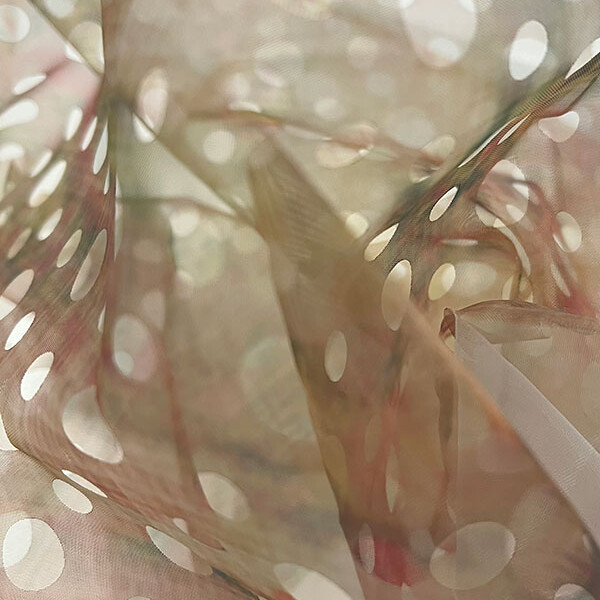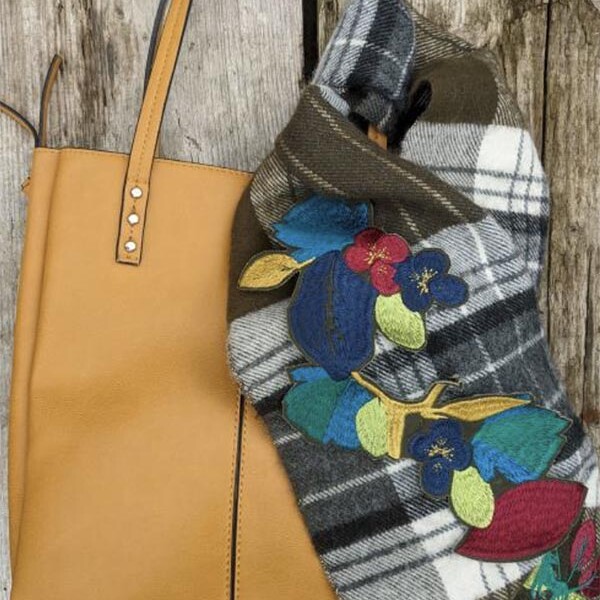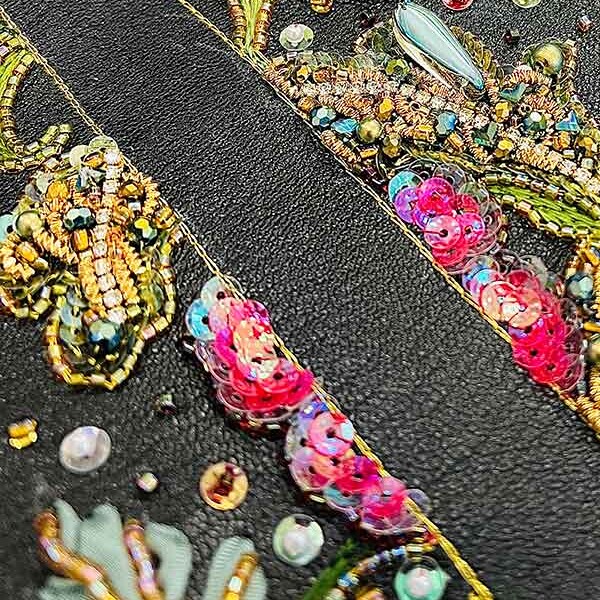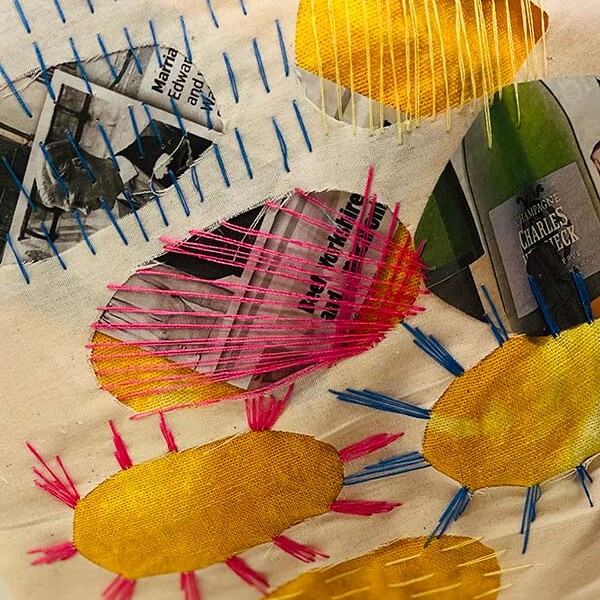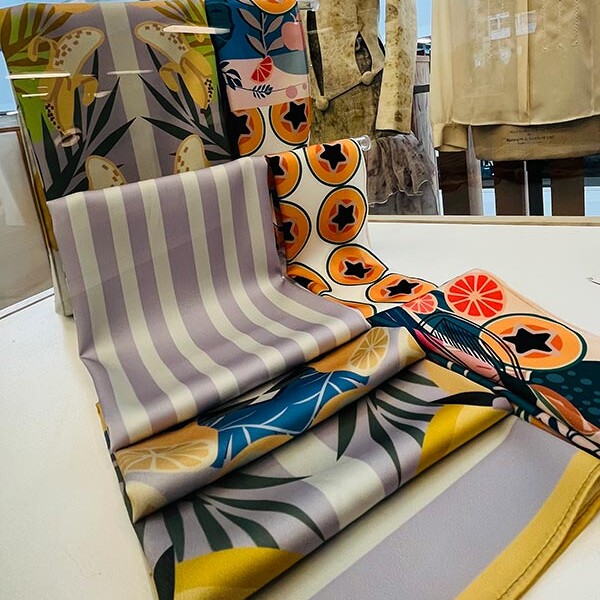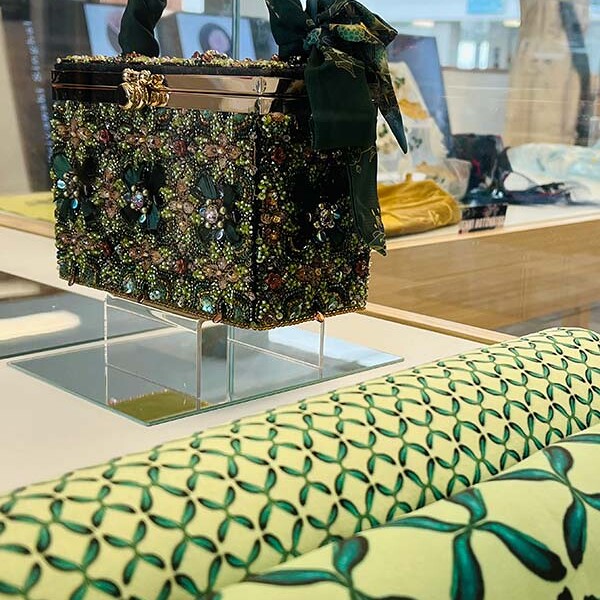Textile Design - BA (Hons)
Currently viewing course to start in 2025/26 Entry.
Textile Design explores the potential of fibres, yarns and processes to create cloth and materials with distinctive qualities and properties. It is a highly creative field with the potential to impact and enrich all aspects of our lives....
- Level Undergraduate
- Study mode Full Time
- Award BA (Hons)
- Start date September 2025
- Fees View course fees
- Subject
- Location City Centre
This course is:
Available with Professional Placement year
Open to International Students
Overview
Textile Design explores the potential of fibres, yarns and processes to create cloth and materials with distinctive qualities and properties. It is a highly creative field with the potential to impact and enrich all aspects of our lives. Knowledge in this area is key in making informed choices that will reduce the environmental and social impact of products and can be used artistically to raise awareness and inspire behavioural change.
Our course nurtures fresh thinking and industry-ready designers and practitioners with expertise in the craftsmanship of Textile Design across the disciplines of Print, Weave, Knit, Embroidery and Material Innovation. The exciting potential of cross-disciplinary practice is supported and encouraged, giving you the option to either specialise or combine disciplines, embracing both digital technologies and traditional craft skills.
Through experimentation in dedicated textile workshops equipped with cutting-edge industry facilities, you will develop the specialist skills, knowledge and experiences required to thrive in a growing field of industry roles and opportunities. Creative play and problem-solving are at the heart of learning and you will be guided by passionate and experienced staff as you discover your own personal expression through the language of design – colour, pattern, surface, texture and image. Birmingham is a vibrant and multi-cultural city providing exposure to diverse perspectives and opportunities. Our inclusive creative community prioritises and celebrates individuality, empowering and supporting you to embrace and embed this within your practice.
Career-focused teaching, industry live briefs and integrated work placements within the first two years of study will support you in identifying professional aspirations amongst the breadth of opportunities within textile design industry and other related fields. Choice points help you focus your experience and collaborative opportunities build your confidence and professionalism. You will develop a portfolio of responsible and future-thinking design concepts to drive the industry’s transition to a circular sustainable economy and build healthy communities.
In your final year, you will have the autonomy to celebrate your individual practice and interests. Our Next Step module at the end bridges the gap between study and industry, helping you plan to achieve your ambitions within the support of your university network.
You will graduate with a clear vision of where you personally fit in the industry and a tailored professional portfolio to get started. Our award-winning graduates emerge as innovative practitioners leading the way working for prestigious established brands or as influential entrepreneurs. They are in a wide variety of fulfilling and meaningful roles, shaping interior, fashion and cultural landscapes as Designers, Brand owners, Artists and Researchers.
What's covered in this course?
The programme reflects the diversity of contemporary textile practice. We pride ourselves not only on the quality of our graduates, but also the diversity of their work. We want you to be you!
Find your direction
With creativity at the heart of learning, you will develop core design and technical skills while gaining vital professional and industry awareness. The course is brimming with choice points to help you focus your experience as you clarify your personal interests.
You will be introduced to wide-ranging textile processes within the core technical areas of print, weave, knit and embroidery and embrace both digital technologies and traditional craft skills. The exciting potential of cross-disciplinary practice is supported and encouraged, giving you the option to either specialise or combine disciplines to take forward as your means of expression.
Career-focused teaching and industry involvement is designed to support you in identifying professional aspirations from the breadth of opportunity within textile design, and help you to further tailor your learning and portfolio towards them.
Having developed a distinctive and career-focused portfolio through the course, our unique Next Step module at the end of the final year bridges the gap between study and industry, allowing you time to put relevant strategies in place to help you achieve your ambitions with the support of the university network.
Professional Placement Year
This course offers an optional professional placement year. This allows you to spend a whole year with an employer, following successful completion of your second year, and is a great way to find out more about your chosen career. Some students even return to the same employers after completing their studies.
If you choose to pursue a placement year, you will need to find a suitable placement to complement your chosen area of study. You will be able to draw on the University’s extensive network of local, regional, and national employers, and the support of our Careers teams. If you are able to secure a placement, you can request to be transferred to the placement version of the course.
Please note that fees are payable during your placement year, equivalent to 20% of the total full-time course fee for that year.

Throughout the course we have had the opportunity to learn a variety of technical design skills through taught content and personal exploration, really allowing us as young designers to build a rich portfolio and wealth of knowledge in preparation for our venture into the industry. The course allows you to discover your own personal hand writing- encouraging us to celebrate our work and individuality in our ideas. The embroidery pathway has highlighted the endless possibilities for me in the design industry whether it be digital embroidery for a commercial application to hand embroidery for the luxury market. The creative freedom of the embroidery specialism has allowed me to identify my passion for couture embroidery and pushed me to explore traditional hand techniques. I thoroughly enjoyed the course as it opened up a variety of exciting opportunities for me from industry collaborations to embroidering an outfit for Beyoncé.
Rosie Gee, Head of Embroidery Designer at Jennifer Clair
Why Choose Us?
- We have a wide range of traditional and cutting-edge equipment, technology, and facilities. We are the first University in the country and second in the world to have Coloreel Embroidery technology within our industry-grade workshops.
- You will have the opportunity to work with and for a range of regional, national and global partners such as the National Trust, Jennifer Clair Couture, London and Joshibi University, Japan which will help you gain employable experience and build industry networks.
- You will have the chance and support to showcase your work to industry-leaders and the public through a variety of opportunities and competitions from New Designers to the Bradford Textile Society Design Competition and the Hand & Lock Prize for Embroidery, where students have successfully won prestigious awards consecutively over the last four years.
- You can enjoy and tailor your module learning to experience working within and for a variety of industry sectors helping you to identify personal professional ambitions and specifically tailor your portfolio.
Open Days
Join us for an Open Day where you'll be able to learn about this course in detail, chat to students, explore our campus and tour accommodation. Booking isn't open for this event yet, register your interest and we'll let you know as soon as booking goes live.
Next Open Day: 28 June 2025
Entry Requirements
These entry requirements apply for entry in 2025/26.
All required qualifications/grades must have been achieved and evidenced at the earliest opportunity after accepting an offer to help confirm admission and allow for on-time enrolment. This can also include other requirements, like a fee status form and relevant documents. Applicants can track their application and outstanding information requests through their BCU mySRS account.
Essential requirements
- Standard offer: 112 UCAS Tariff points. Learn more about UCAS Tariff points.
- Accelerate offer: 80 UCAS Tariff points. Find out more about BCU Accelerate.
Applicants will also need to submit a good portfolio.
If you have a qualification that is not listed, please contact us.
Don’t meet our entry requirements?
You could apply for a foundation course or a course at our International College. These routes have lower entry requirements and act as the bridge to a full degree. To find out more, please select your status:
Fees & How to Apply
UK students
Annual and modular tuition fees shown are applicable to the first year of study. The University reserves the right to increase fees for subsequent years of study in line with increases in inflation (capped at 5%) or to reflect changes in Government funding policies or changes agreed by Parliament. View fees for continuing students.
Award: BA (Hons)
Starting: Sep 2025
- Mode
- Duration
- Fees
- Full Time
- 3 years
- £9,535 in 2025/26 ✱ Important note for this price
- Apply via UCAS
(↩Back to price) * The Government is proposing to increase the cap on full-time regulated tuition fees to £9,535 for 2025/26 and the University is planning on increasing fees to that maximum level once legislation is enacted. Part-time fees are charged pro-rata, where applicable.
International students
Annual and modular tuition fees shown are applicable to the first year of study. The University reserves the right to increase fees for subsequent years of study in line with increases in inflation (capped at 5%) or to reflect changes in Government funding policies or changes agreed by Parliament. View fees for continuing students.
Award: BA (Hons)
Starting: Sep 2025
- Mode
- Duration
- Fees
- Full Time
- 3 years
- £17,690 in 2025/26
Guidance for UK students
UK students applying for most undergraduate degree courses in the UK will need to apply through UCAS.
The Universities and Colleges Admissions Service (UCAS) is a UK organisation responsible for managing applications to university and college.
Applying through UCAS
- Register with UCAS
- Login to UCAS and complete your details
- Select your course and write a personal statement
- Get a reference
- Pay your application fee and submit your application
Guidance for International students
There are three ways to apply:
1) Direct to the University
You will need to complete our International Application Form and Equal Opportunities Form, and submit them together with scan copies of your original academic transcripts and certificates.
2) Through a country representative
Our in-country representatives can help you make your application and apply for a visa. They can also offer advice on travel, living in the UK and studying abroad.
3) Through UCAS
If you are applying for an undergraduate degree or a Higher National Diploma (HND), you can apply through the UK’s Universities and Colleges Admissions Service (UCAS).
You can request a printed form from your school or nearest British Council office. You will be charged for applying through UCAS. Birmingham City University’s UCAS code is B25 BCITY.
Portfolio guidance
If you receive an offer to study this course, you will be required to submit a portfolio. We ask that this is submitted within four weeks of receiving your offer.
Please see our portfolio guidance page for tips on putting your portfolio together.
Portfolio guidance
If you receive an offer to study this course, you will be required to submit a portfolio. We ask that this is submitted within four weeks of receiving your offer.
Please see our portfolio guidance page for tips on putting your portfolio together.
Personal statement
UK / EU students are required to submit a personal statement as part of their application for this course.*
The personal statement gives you a crucial opportunity to say why you’re applying and why the institution should accept you.
Here are the key areas you’ll need to address:
- Course choice - Why does this course appeal? What areas are of particular interest?
- Career plans - If you have a specific career in mind, say how your chosen course will help you pursue this goal.
- Work experience - Mention any work that is relevant to your subject, highlighting the skills and experience gained.
- School or college experience - Highlight skills gained at school/college, eg summer schools or mentoring activities.
- Non-accredited skills or achievement - eg Duke of Edinburgh Award, Young Enterprise scheme.
You should also mention your future plans – if you’re planning to take a year out, don't forget to give your reasons. Talk about any subjects you’re studying that don’t have a formal assessment and any sponsorships or placements you’ve applied for. And don't be scared to add in details about your social, sports or leisure interests.
Worried about Personal Statements?
If you've got no idea where to start or just want to check you're on the right track, we’ve got expert advice and real examples from our students to help you nail your personal statement. You can even download our ultimate personal statement guide for free.
*Non-EU students are not required to submit a personal statement when applying for this course.

Financial Support
We offer further information on possible undergraduate financial support. This includes the type of loans, grants and scholarships available both from the government and from Birmingham City University.
Course in Depth
Year one
Guided and encouraged by an experienced teaching team, engaged in current research or practice, and through workshop experiences supported by e-learning, you investigate key areas of weave, knit, embroidery and printed textiles before choosing one, or two technical areas to explore in the first year of the course.
In order to complete this course a student must successfully complete all the following CORE modules (totalling 120 credits):
In this module you will explore the connections between the creative fashion and textile industries in the past, and how this informs present and future trends. You will be introduced to the way individuals have influenced culture, freedom of expression and experimentation, and how this pushes boundaries and explores identity.
Through reflection you will analyse your research and the connections that you discover, developing core skills and communicating your findings and ideas through the use of industry-standard software.
Shared content is delivered via blended learning, this is underpinned by your course-specific content which is delivered on campus.
This module introduces you to the first two areas - printed and knitted textiles. Printed textiles tend to be more about image and surface qualities and knitted textiles is more about yarn and construction. The contrasting experience will help you to discover where your strengths and interests lie.
Workshop demonstrations will introduce you to the process of screen printing and the use of domestic knitting machines to build your knowledge and understanding through hands-on making. As minimising waste and keep materials in circulation for longer is important, you will be sourcing and integrating excess materials into sampling, choosing them for their colour, surface, texture and structural potential. You will be generating a range of experimental ideas, considering their potential within the world of fashion.
This module continues to focus on experimentation with materials, processes and colour to build core skills and your awareness of the scope of our discipline. It introduces you to the other key approaches to textile design – Embroidery and Weave.
Embroidery can be more about image, surface and textural qualities, and woven textiles is more about fibre, yarn and structure. As with the previous module, the contrasting experiences will help you to discover where your strengths and interests lie, whilst continuing to design with the world of fashion in mind.
The ability to put original ideas into an effective repeating pattern is core knowledge demanded by industry, and this module introduces you to the world of pattern creation, looking at compositional structures, theories, and the impact of colour, scale, rhythm and balance.
There are a variety of textile-specialist software and equipment involved in textile design and production and digital technologies have a key role to play in reducing the resources involved in the sampling and development. Adobe Photoshop remains the key program for pattern creation.
You will start the module by forming a personal concept and generating original, versatile imagery for pattern exploration. You will then test a range of compositional structures and problem-solve ideas using paper-based and digital approaches, including tablet-based drawing programs, Adobe Photoshop and AI.
Industry needs creative problem-solvers who can help implement sustainable design strategies that ensure that people and planet are considered equally alongside profit.
For this module your starting point will be a tailored garment. You will begin by considering its likely production journey, undertaking research to explore its potential social and environmental impact. You will use a lifecycle approach and learn about systems-thinking to gain awareness of the complex nature of our industry and the different sectors that exist within it. You will also see that the decisions textile designers make can make a significant impact in minimising a products negative impact.
Year two
In your second year, you explore trends and predictions in fashion and interior industries and explore the scope of career sectors and job roles open to textile designers. You shape your learning by choosing from a range of industry-focused and entrepreneurial design challenges and build professional experience through a collaborative design challenge or Work experience – all designed to help you identify your strengths and career interests.
In order to complete this course you must successfully complete all the following CORE modules (totalling 100 credits):
This level 5 undergraduate module is designed to equip students with the essential skills and knowledge necessary for a successful transition into the industry work placement and beyond. The module focuses on cultivating a deep understanding of professional practices, industry expectations, and personal development strategies.
Through a combination of theoretical knowledge, practical exercises, case studies, and industry guest lectures, this module provides students with a solid foundation for their future careers empowering them to thrive in a competitive and dynamic industry landscape.
Level 5 is all about EXPLORATION. There are lots of exciting sectors, markets and job roles open to Textile Designers, each involving slightly different challenges, work requirements and skill sets. There is a demand for designers who can help drive change to build an industry that is sustainable and contributes to an inclusive and equitable society.
This module focuses on Birmingham and the West Midlands offering a range of mini-briefs that simulates different design sector scenarios to help you begin to consider your place within industry and the contribution you can make.
Industry wants confident, informed, original thinkers who have the capacity to be both imaginative and pragmatic. What is your skill or what do you want to be known for? What have you been introduced to so far that you are curious to revisit and take further? What talent have you discovered that you want to nurture?
In this module you will identify your strengths and interests to build distinctiveness and originality to your creative practice and portfolio.
In order to complete this course a student must successfully complete at least 20 credits from the following list of OPTIONAL modules:
The purpose of the work placement module is to enable you to develop professional attributes and subject skills through experience in the work place, and to critically reflect upon your learning in that context. You will normally be expected to arrange your own placement, with support from academic staff and BCU Careers.
This module provides an opportunity for you to apply your knowledge and skills to an external, professional brief. The brief will be set by or in discussion with an external client/agency/community and could be a ‘real life’ problem to be solved, or a simulation. The resulting project should consider sustainability and address relevant UN Sustainable Development Goals as a key aspect of contemporary creative industries work. The module provides an opportunity for you to engage in a responsive, imaginative and professional manner with an aspect of your subject area, which contributes to the development of employability skills within the supportive infrastructure of the University. You will collaborate with students, and where relevant with other stakeholders, and will be supported to approach the project with curiosity, openness, critical thinking, innovation and practical and technical skills, in order to produce project outcomes and/or solutions which meet the required brief.
Creative careers can take people to a wide variety of, sometimes, unexpected destinations. Learning to see and exploit opportunities can be the key to a rewarding portfolio career making good use of your creative skills whilst earning a living from doing what you love, whether it's producing creative artefacts, performing, offering a service or consultancy. Learning to promote and ‘pitch’ those ideas to others is core to developing a successful independent, creative and entrepreneurial career. This module will build your skillset to enable you to talk confidently about you and your work. It will also help you to find or create opportunities, some may even come as a surprise to you!
Core modules are guaranteed to run. Optional modules will vary from year to year and the published list is indicative only.
Professional Placement Year (Optional)
In order to qualify for the award of BA (Hons) Textile Design with Professional Placement Year a student must successfully complete the following module.
Professional Placement Year 120 credits
Year three
Your final year gives you the opportunity to hone your portfolio and experience to suit your career ambitions through focused projects.
In order to complete this course you must successfully complete all the following CORE modules (totalling 120 credits):
This Level 6 undergraduate module is designed to further develop your research and inquiry skills within the context of the fashion and textile industry.
You will undertake a range of research methods on a topic of personal interest. You will investigate and critically analyse the findings. You will be applying a reflective comment to the evidence to deepen your understanding of your field and considering real-world challenges in the industry.
You will present conclusions and recommendations in a proposal that feed into an independent project.
Building on the research you have undertaken in the previous module, in this module you will write and execute a practical brief, one that enables you to immerse yourself in the materials, processes and approaches that make you shine and generates portfolio content that targets your career ambitions.
This module is about selecting and progressing key ideas from the portfolio of work presented in the previous module, undertaking focused design development to realise their potential as impactful resolved design statements. This may involve problem-solving aspects like: material sourcing, scale, composition, colour and application.
What now? What next? This module is the culmination of the research and design outputs of the last three modules and provides a supportive space to plan your transition between education and employment. In this module you will, strengthen your portfolio, build an online promotional presence and formulate an action plan, all designed to help you navigate the next step towards your career ambitions.
Download course specification
Download nowCourse structure
Year 1
The first year is all about experimentation! You will engage with different approaches to drawing and idea generation, learn in depth about materials, composition and colour in relation to textile design, and be challenged with working to your first client brief. You will be introduced to our workshops to learn and sample in the areas of woven, knitted, embroidered and printed textiles, as well as MAT_er.LAB, our biomaterials experimental laboratory space. You will identify the technical language (or languages) that best suit your skills and interests.
A contextual lecture/ seminar programme builds knowledge of historical textiles which provides the vital reference points needed within contemporary design as well as critical thinking skills.
Year 2
In your second year, you will extend your technical skills while beginning to understand the scope of career opportunities open to you. You will start the year by learning about key industry sectors and developing a personal CV and creative promotional material to help you establish your areas of interest.
You will then be introduced to and choose practical design challenges from across five key employment sectors which have been designed to help you consider your place within the industry:
- Bespoke Fashion Textiles
- Contemporary Culture and Craft
- Styling and Trend Forecasting
- Surface Pattern and Technologies
You will study market and client awareness, trends in both fashion and interior design sectors, commercial considerations with industry-facing projects as well as business principles, ethics and sustainability issues.
You can then choose to end the year by undertaking a professional Work Placement, Collaborative Practice or Live Brief experience, building your knowledge in the workplace or working alongside other creative students from across the Faculty.
Year 3
In Year 3 you will continue your design journey in relation to your chosen career pathway and through your choice of textile language, but with a much more independent and self-directed focus.
You will begin by writing your dissertation around a subject of interest. This will often kickstart themes and concepts that can form the basis of practical work to follow.
The final project is split into two modules, to help structure the experience. You will firstly engage in broad and personal contextual research to inform and inspire you in creating a professional portfolio of extended design work and resolve a creative brief that is aligned with your creative ambitions.
Our unique Next Step module then equips you with all you need to make the leap into employment or Post- Graduate study. You will create an action plan, extend your portfolio through targeted competition entries and promote your strengths and achievements via digital platforms – all designed to help you leave confident in pursuing your career ambitions.
Find your direction. Learn a range of textile skills, including print, then specialise in your second year.
The learning environment
Our teaching encompasses a wide range of learning and teaching methods, and immersive, interactive studio/workshop experiences are supported by e-learning to provide a holistic experience. Equipment includes a suite of digital printers, jacquard looms, computerised AVL studio looms, digital embroidery machines, V-bed Dubied knitting machines and laser cutting equipment, in addition to traditional facilities which comprise of a dye lab, screen-printing tables, transfer presses, flocking facilities, knitting machines, looms and rug tufting guns.
Studios, workshops, computer suites and library facilities operate late night access to suit night owls as well as early birds! We have professional support teams on hand to help you every step of the way – organising Disability Support, wellbeing, housing or careers.
Supportive tuition in both one-to-one and combined groups scenarios throughout the course fosters the interchange of ideas and promotes critical thinking. The diverse experience of the academic staff reflects the course ethos – all are practising designers/visual artists and many have worked internationally.
The course actively fosters links with organisations and industry, providing a continuously updated contemporary educational experience.
Studio activities
Practical drawing sessions help to get design projects underway in a friendly and supportive environment, building your skills and confidence by sharing and learning as part of a peer group.
We design stimulating workshops and activities to help to develop problem-solving abilities and interpersonal skills as well as subject specific knowledge and help to prepare you for the real world by setting industry-facing briefs and running design projects as if in a commercial studio. With role-play sessions, reviews and critiques, you have opportunities to test your professional networking skills, ready to take to your perfect job.
Working alongside friends to learn and understand the subject of textiles in relation to the wider industry, you will participate in seminars to discuss contemporary design issues, such as ethical fashion, global trends and international manufacturing, while working out what makes you tick.
Discover the community in the College of Jewellery, Fashion and Textiles where our students talk about their journeys here at BCU which has inspired creativity and innovation.
Celebrating Textile Design Excellence at Made in the Middle Exhibition
Explore the inspiring work of Senior Lecturer Zoe Hillyard and graduate Mahawa Keita, featured in the Made in the Middle exhibition. Gain insights into their creative journeys, the challenges they’ve overcome, and how the BA Textile Design programme has shaped their work.
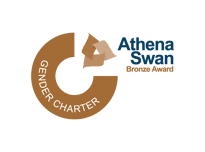
Athena Swan Bronze Award
Our Jewellery, Fashion and Textiles courses have been awarded the Athena Swan Bronze Award for our commitment to Equality, Diversity and Inclusion (EDI).
Athena SWAN is a quality charter mark framework and accreditation scheme established and managed by the UK Equality Challenge Unit in 2005 that recognises and celebrates good practices in higher education and research institutions towards the advancement of gender equality: representation, progression and success.
Employability
Enhancing your employability
Our BA (Hons) Textile Design degree is designed to develop and hone the skills, knowledge, vision and creativity to succeed in your own creative practice.
With strong level of craftsmanship in traditional and digital design, you will become adept at a number of textile processes, including print, embroidery, weave and knit. You will have multiple opportunities within every year of the course to experience working across a variety of industry sectors. This will provide you with a deeper understanding of where you fit within the industry and a tailored professional portfolio and promotional material.
Our award-winning graduates emerge as innovative practitioners leading the way as influential Brand owners, Artists, Researchers and Designers for prestigious established brands. As creative problem-solvers, they are in fulfilling and meaningful roles shaping our interior, fashion and cultural landscapes.
Links to industry
The College of Fashion and Textiles works with local, national and international businesses to enhance student learning through placements, workshops, live briefs and guest lectures from industry professionals.
Graduate Jobs
Our award-winning graduates progress to gain employment as Artists, Researchers, Educators, Trend Forecasters and Designers for a variety of prestigious and established brands, as well as influential brand owners.
Destinations: NEXT, Hobbs, Hand & Lock, Jennifer Clair, Coloreel, Amtico, CraftSpace, STYLUS, Unique Style Platform, Emma Shipley, Design44, MA at Royal College of Art, Jimmy Choo Fashion Academy.
Our Graduates
Emily Higgs

I'm a full-time Designer in the Product and Laying Pattern Design Team at Amtico Flooring.
I first heard about Amtico through the BCU tutors, whilst I was working at the University. After a quick interview process, I started a 6-month internship in June 2021 and have since worked my way up from an Intern, through to Junior Designer, to my current position.
My role is really diverse, from international travel to gather trend and market research, using CAD to recolour new print designs, through to collaborating with other departments across manufacturing to develop new laying patterns and even presenting new collections to global sales teams and customers.
The Textile Design course at BCU helped me understand how to develop cohesive commercial collections - no matter what the product!
The engagement from tutors, both during the course and since graduation, has helped grow my confidence in both my design and professional skills, and I definitely wouldn't be where I am today without their support!

Rebecca Lewis
Since graduating I have interned with Next menswear in the Print and Graphics Department. My internship with them came after my work was recognised at the 2018 New Designers exhibition, a hub for textile graduates to exhibit their work and make valuable contacts within the industry. The design department at Next contacted me directly after the exhibition and offered me the place.

Kate Hollowood
My current role is designer maker and company director of my company, Kate Hollowood Design. I work for myself and am currently the only employee, meaning I am responsible for everything involved in running a creative business; from making accounts to following up leads and attending trade shows as well as admin, pricing, quotes, diary bookings, product development and marketing…. the list goes on!

Gabbie Armstrong
I was lucky to have a part time job in the fashion industry during my final year at university. It wasn’t easy to juggle work and study commitments at the same time but I was dedicated to building my career as soon as I could.
The trainee position at Outfit Fashion helped me to understand the company’s structure and the different roles I could have in the industry, but most importantly I learnt about applying the principles of buying/merchandising and design that I had been learning throughout the course. Once I graduated the position became a full time role and I was able to develop my skills within this field even further.

Which Textile Design Career is Right for You?
Graduate Sophie Hawkesford offers an insight into the wide range of career paths that are accessible with a textile design degree.
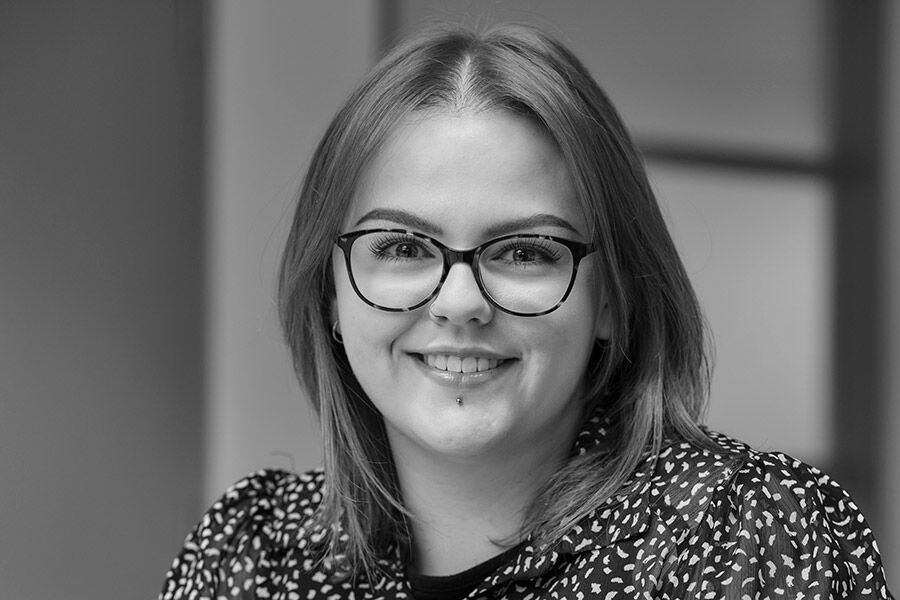
Emily Higgs
The experience and knowledge Emily gained from her textile design degree is extremely relevant to her current position. While she doesn't design fabrics/textiles directly, Emily utilises the transferable skills she developed during her course.
Facilities & Staff
Our Facilities
Fashion and Textiles courses are based at our Parkside Building, which is part of our multi-million pound City Centre Campus development in the heart of Birmingham's Eastside development.
Our staff
Jane Watts
Course Leader - BA (Hons) Textile Design
Jane is an interdisciplinary practitioner, and began her career in textile design. She has since worked as National Craft Advisor for the Women’s Institute in the charity sector, and has 20 years’ experience of teaching in higher education across a range of creative programmes.
More about JaneZoë Hillyard
Senior Lecturer | BA (Hons) Textile Design
Zoë Hillyard is a Senior Lecture and Course Director for BA(Hons) Textile Design at Birmingham City University. She is a Senior Fellow of the Higher Education Academy (HEA) and has over 20 years of lecturing experience in both national and international contexts. Zoe is also an established textile artist craft practitioner working with...
More about ZoëClare Langford
Senior Lecturer - BA (Hons) Textile Design
Clare Langford is a Senior Lecturer on the BA (Hons) Textile Design course and Outreach Coordinator at BCU. She has taught in higher education for over 24 years, is a Fellow of the Higher Education Academy (HEA) and holds a PGCert in Enhancing Learning and Teaching in Higher Education. She has a background as a designer maker exhibiting work...
More about ClarePoppy Braddy
Lecturer - BA (Hons) Textile Design
Poppy Braddy is a Woven Designer, Material Researcher and Lecturer. She holds an MA in Textiles from the Royal College of Art and whilst completing her BA in Textiles in Practice at Manchester School of Art, spent time in exchange at Hong Kong Polytechnic University.
More about Poppy